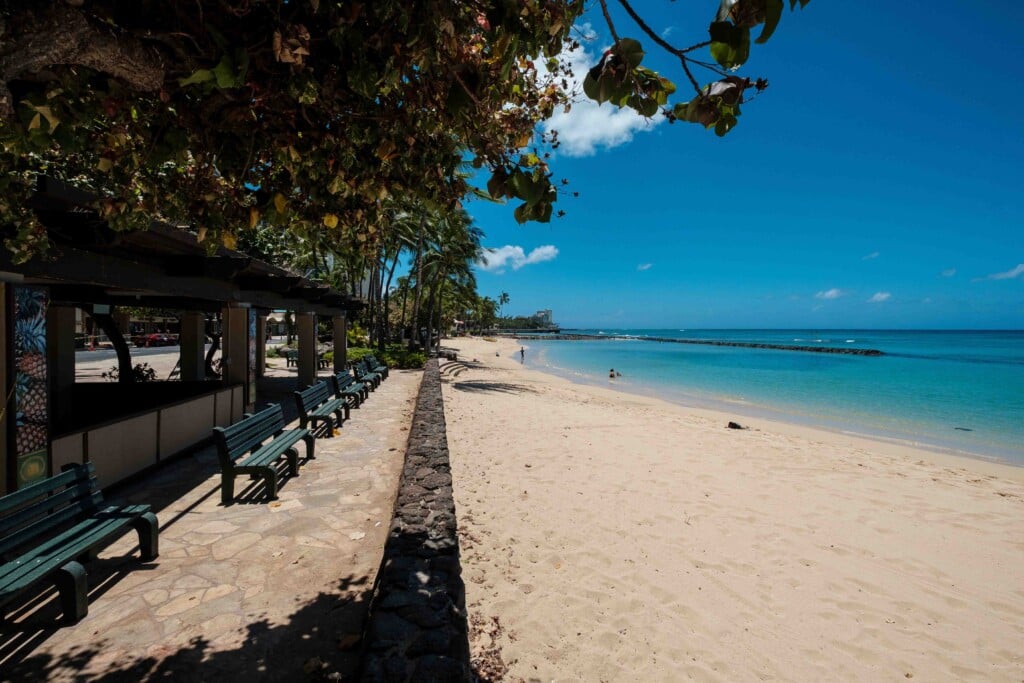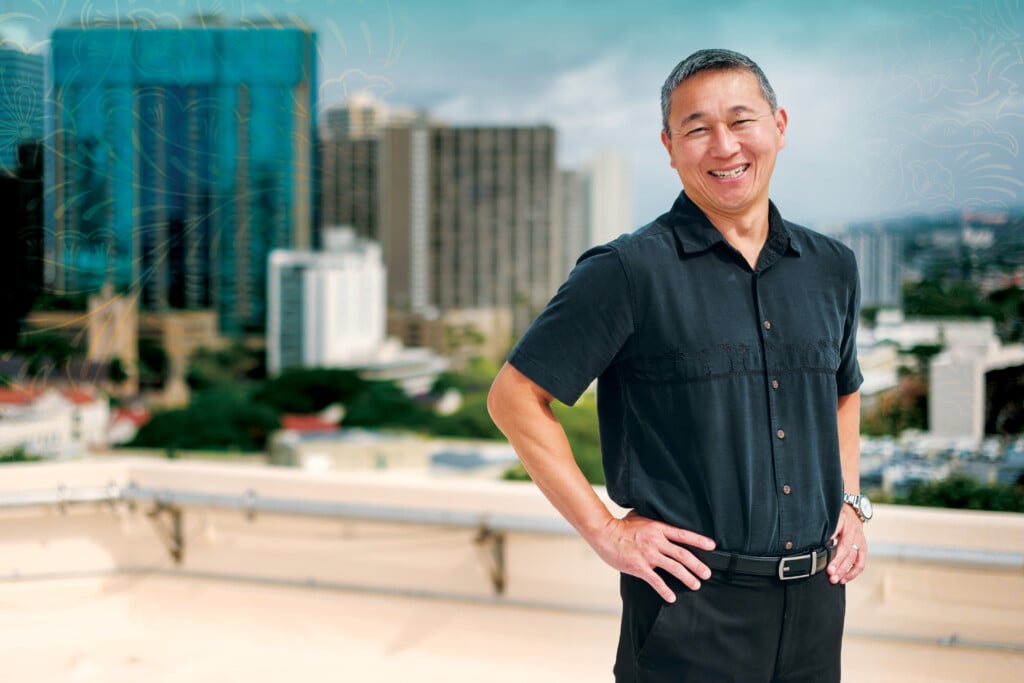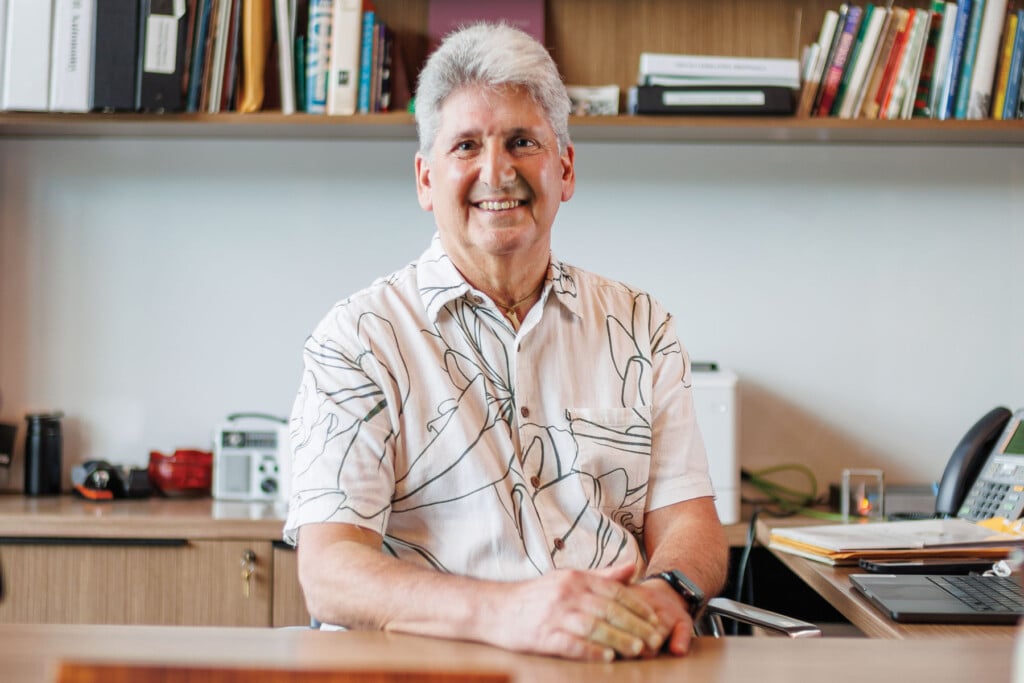Book Excerpt: “Our Beaches Were Empty, Our Hospitals Full”
Authors Kirk Caldwell and Georgette Deemer interviewed local leaders for an inside view of what it was like to navigate the pandemic.

Dr. Jonathan Dworkin, specialist in infectious diseases with The Queen’s Health System: I don’t think you can talk about the pandemic without acknowledging that the whole creation of The Queen’s Medical Center happened in the shadow of a devastating epidemic disease that depopulated the Hawaiian Islands and destroyed the Hawaiian people.
For me, as an ID (infectious disease) doc walking around in early 2020, I’m walking through Queen’s Hospital, which was built in the wake of a smallpox epidemic, and I’m looking up at the portraits of Queen Emma on the wall, and I’m thinking to myself, Boy, I gotta step up. This is, historically, the cause of great tragedy here and we have to do everything we can to make sure that this history doesn’t repeat itself here in Hawai‘i.
Peter Ingram, CEO of Hawaiian Airlines: Come April 2020, we were flying four round-trip flights – Honolulu to Maui, Līhu‘e, Kona, Hilo – a daily flight to Los Angeles and a daily flight to San Francisco that generated much more revenue from cargo, below the floor, than it did from passengers above. But we thought it was important to keep connectivity for both passengers and cargo for essential travel.
And of course, for the Neighbor Islands, we were the only game in town. We were carrying healthcare workers, we were carrying electricity repair people – we’ve always sort of known that that’s the highway system of the state, and it was very true when the only people who were traveling were essential workers. It was important to them that we kept the highway system operating.
Ray Vara, CEO of Hawai‘i Pacific Health: In my mind, the most important thing we learned during the pandemic was that leadership matters. It was a time when leaders were required to step up and make decisions. The good news was that given the nature of the pandemic environment, it allowed us to 1) be nimble, and 2) be humble enough to correct course when necessary. Each day brought a different level of awareness that may instigate a different decision. I saw leaders who were willing to lead and willing to make those adjustments, sometimes on a daily basis.
Ron Mizutani, then CEO of Hawai‘i Foodbank: Raising your hand because you’re hungry, there’s a stigma to it. I’m not comparing it to domestic violence, but it’s very similar where the shame factor is very real. And when you see cars lined up the way they did to receive food, and some of them absolutely in tears leaving, thanking you, because both spouses or entire families in some cases were without jobs.
The Covid infection rate among the Pacific Islander community was the highest in the state due to many factors, including language and cultural barriers, and crowded living conditions. Dr. David Derauf, CEO of the nonprofit Kōkua Kalihi Valley, was an important advocate for Pacific Islanders and other disadvantaged groups. In this excerpt, Derauf describes to co-author Kirk Caldwell why some Pacific Islanders refused to get the vaccine.
I hate what’s happening now. Because I see people vilifying them: “These are bad people who aren’t getting vaccinated.” No, they are not bad people. They are our neighbors, those are our friends, those are our community members.
My own take, talking to friends in the Pacific Islander community, is that there’s just a long history of distrust. We have not bridged that community well still. They feel like, “You haven’t been here for me, ever. Why am I going to trust you now? You say you’re here for me. You’ve never been here for me before.” I think there’s a lot of that.
What works for me with the vaccine — and I most deal with the vaccine hesitant, not the resistant — it is exactly what I think you would do, Mayor. You would sit down with the person and hear them out. What’s going on? How are you, first of all? Right? The basics! How are you doing? What’s going on in your life? Because this virus might not be as big compared to “My son is in court next week — I’m worried about it, Doc.” OK, I’m going to hear you out about that first.
Maybe then we’ll come around to the vaccine. Hey, has anyone talked to you about the vaccine? “Well, yeah, I heard at church that it’s not such a good idea.” Okay, what did they say? What do you think about that? What would it take to change your mind? You’re not ready today. You want to come back next week, we’ll talk about it again? That’s what it’s taking. It’s really one by one. Slow by slow. It’s happening.
My very first patient with Covid was a 38-year-old woman. I called her and said, “Your test came back positive.” Silence. And I had known her; she’d been my patient. Chuukese. We didn’t have a strong relationship, but we had a strong beginning to a relationship already. I said, “We need to ask you to isolate yourself. What’s your living circumstances like?” “Well, there’s eight of us in a two-bedroom.” “Is there a way you can have a room to yourself?” Hard. “You can’t go to work tomorrow. You must stay home from work.” She said, “I’m the only one in the house with an income right now. What happens to us if I don’t go to work?”
Fortunately, her only symptom was a headache. A bad headache. “But you can’t go to work tomorrow. You’re going to infect your co-workers.” She was in fast-food. “Dr. Derauf, if I don’t pay the rent, where do you think we’re going to be?” That was my first eye-opener. The easy part of this is to test you. Now I have got the hard part, which is what are we going to do for you? How are we going to support you?
Authors Kirk Caldwell and Georgette Deemer, and Dr. Jonathan Dworkin, an expert in infectious diseases, will discuss the local pandemic response at the Barnes & Noble bookstore at Ala Moana Center, July 29, 2023 at 1 p.m.






